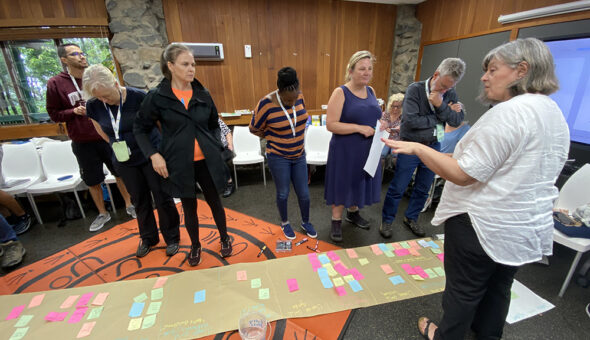Rachel Wilder, Shona McIntosh, Abena Baiden, Angie Bailey, Clare Hawkes, Hannah Hogarth, Lizzi Milligan, Bukola Oyinloye were contributors to the Epistemically Just Methodologies 2021 Seminar Series, University of Bath
This final blog post in our series about epistemically just research is about how research participants experience research ethics. The perspective of participants is informed by their own relational experiences (race, ethnicity, socio-economic background) rather than an understanding of what research ethics is in terms of university processes. Building on discussions that our seminar group engaged in – which centred the participants and their contexts in defining ethics – we suggest that researchers have an important role to develop researcher-research participants relationships at the outset and putting greater emphasis on participants’ views and experiences.
Institutional bias in research ethics
Research is shaped by institutional and disciplinary ethical procedures. Such normative procedures emerge from within universities which, generally, have historical roots in power and knowledge hierarchies embedded in Western values (Santos, 2014). In effect, academic forms of knowledge and structure ‘come first’, in more ways than one. In social sciences this can have negative repercussions if it results in pushing participants out of the research that relies on them.
One problem with institutional approaches to ethics is the assumption – often a rule –that methods, including research samples and approaches to engaging with research participants, are fully defined by the time the research is presented for ethical approval. Only after being approved by institutional ethics committees can researchers contact potential research participants. As such, the participants are absent from ethical approaches, as well as methodology. This sequence of events is deeply problematic for the development of equitable and trusting researcher/participant relationships. Participants may feel that their values and ethics are considered irrelevant in the research process.
Institutional perspectives to ethics are informed by research disciplines and researchers, as well as supervisors of doctoral researchers, may feel their professional integrity and competence is being undermined if institutional agendas such as liability and reputation come to dominate.
My ethics? Your ethics? Our ethics.
Researchers’ interpretation of institutional ethics protocol is grounded academic training. But like research participants, they also bring expectations, assumptions and their own experiences of, for example, race, ethnicity, gender or socio-economic background to the project. A potential mismatch between researchers’ and participants’ understanding of ethics may emerge if participants are excluded from defining ethical boundaries and standards for research. By failing to engage participants and consider participants’ experiences and concerns in the research process, researchers risk engaging in extractive practices that use participants’ knowledge to create researchers’ ‘outputs.’ Given the imbalance of power between researchers and research participants we explored in our previous post, the onus is on the researcher to navigate ethical boundaries and values to define a bespoke ethical approach for each study that works for all involved. The group identified reflective, inclusive practices as underpinning just research methods based on trusting relationships.
Ethics as process: Before, during and after data generation
Since participants cannot fully contribute to research from the start because institutional ethics are a single-point, front-loaded exercise, researchers are put in the position of presuming to understand what matters to participants. When this happens, researchers, and research institutions, retain power to shape the research. If researchers have to tweak their design to adhere to institutional agendas, participants’ values and experiences are pushed further towards the margins. The quality of the research data and the research relationship could both be compromised.
Researchers should explicitly recognise and explore different ethical perspectives at all stages of their research, even if they are difficult. In reflecting on and with research participants at multiple points in time, researchers can build up a trusting relationship with research participants. Ethics is about relationships.
Can we re-design institutional ethical processes to prioritise participants?
At this point in time, the university is re-designing ethical protocols, procedures and bodies across the institution. This is an opportunity for university decision makers to reflect on the diverse interests embedded in research – especially those of participants – and make research processes more just.
Ethics committees, staffed by academics with particular interests in ethics, and peer scrutiny is an established practice in academia for strengthening research. Can institutional approaches to ethical oversight incorporate flexible processes that welcome participants’ input prior to submission of an ethics application to the relevant ethics committee? This would need an institutional ethics procedure that centralises the researcher-participant relationship.
Series reflections
This blog series highlights our genuine concern about how researchers engage with participants and with participants’ experiences of research. The collaborative writing workshop that led to these 3 posts leave us with some considerations:
- Ethics is caring: the researcher will care for participants’ experience of research.
Ethics is collaborative: it is rooted in ongoing dialogues with participants and also involves institutional ethical bodies at strategic points in time. - Ethics is situated: it is tailored to the research context and participants
Ethics is responsive: procedures need to be flexible to account for changing circumstances, unforeseen events and people’s experiences of the research as it evolves. - Ethics is ongoing: ethics are embedded at every stage, from conception to design to data generation and beyond.
- Ethics is integral to just methods: ethics and methodology are inextricably intertwined, so ethics and ethical partnerships should precede final decisions about methods.
Responses

New insights from the blog to me are 'My ethics, Your ethics, and or ethics'; 'Ethics as process' which imply how research ethics works in research process.